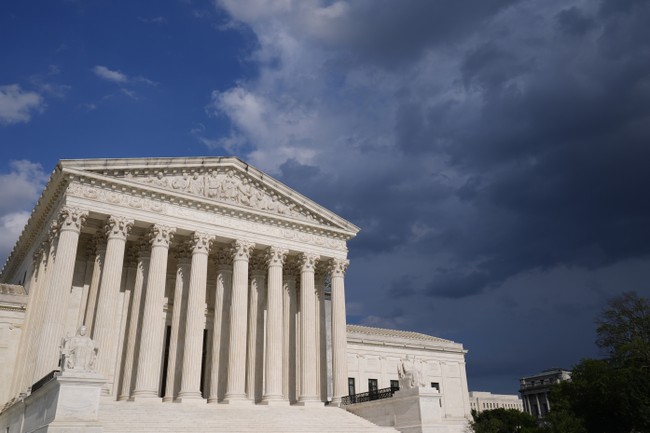
In addition to hearing the first oral arguments of its 2024 term, the U.S. Supreme Court issued numerous Orders on Monday morning. One of those was the court’s decision not to take up the Biden administration’s appeal from the Fifth Circuit Court of Appeals regarding a Texas abortion law.
In January, the Fifth Circuit ruled that Texas’ abortion law is not preempted by the federal Emergency Medical Treatment and Labor Act, 42 U.S.C. § 1395dd (“EMTALA”) and upheld an injunction issued by the District Court. That decision laid out the statutory background of the issues.
The Emergency Medical Treatment and Active Labor Act of 1986 (EMTALA), 42 U.S.C. § 1395dd, requires hospitals with emergency departments that receive Medicare reimbursement to provide a medical screening and, if an emergency medical condition exists, necessary stabilizing treatment or an appropriate transfer irrespective of the individual’s ability to pay. EMTALA was enacted to combat patient dumping, the practice of some hospitals turning away or transferring indigent patients without evaluation or treatment.
The State of Texas, along with two medical associations with members located in Texas (Texas plaintiffs), sued the Department of Health and Human Services (HHS), HHS Secretary Xavier Becerra, the Centers for Medicare and Medicaid Services (CMS), the Director of the Survey and Operations Group for CMS, and the Director of the Quality Safety and Oversight Group for CMS (collectively HHS), challenging HHS’s guidance on EMTALA’s requirement that physicians must provide an abortion when that care is the necessary stabilizing treatment for an emergency medical condition. The Texas plaintiffs alleged that the guidance mandates providers to perform elective abortions in excess of HHS’s authority and contrary to state law and sought to enjoin its enforcement. The district court enjoined the guidance’s interpretation of EMTALA within Texas or against any member of a plaintiff organization. HHS appealed. For the following reasons, we AFFIRM.
As further explained in the decision:
In the wake of Dobbs, so-called trigger laws sprung into effect, meaning laws that were enacted in anticipation of abortion’s return to state control automatically went into effect. The Texas Human Life Protection Act (HLPA) is such a law. Dobbs triggered HLPA’s 30-day clock and the law went into effect on August 25, 2022. The HLPA prohibits abortions unless the pregnancy places the female at risk of death or poses a serious risk of substantial impairment of a major bodily function. Tex. Health & Safety Code § 170A.002(b)(2). In such circumstances, the person performing, inducing, or attempting the abortion must be a licensed physician exercising reasonable medical judgment by providing the best opportunity for the unborn child to survive unless, in the physician’s reasonable medical judgment, it would pose a greater risk of the pregnant female’s death or a serious risk of substantial impairment of a major bodily function of the pregnant female. Id. § 170.002(b)(1), (3).
With its order denying certiorari on the case Monday, the Supreme Court thus allows the Fifth Circuit ruling to stand.
The Biden administration had asked the justices to throw out the lower court order, arguing that hospitals have to perform abortions in emergency situations under federal law. The administration pointed to the Supreme Court’s action in a similar case from Idaho earlier this year in which the justices narrowly allowed emergency abortions to resume while a lawsuit continues.
The administration also cited a Texas Supreme Court ruling that said doctors do not have to wait until a woman’s life is in immediate danger to provide an abortion legally. The administration said it brings Texas in line with federal law and means the lower court ruling is not necessary.
Texas asked the justices to leave the order in place, saying the state Supreme Court ruling meant Texas law, unlike Idaho’s, does have an exception for the health of a pregnant patient and there’s no conflict between federal and state law.
Similarly, the Texas case will now return to the District Court for further proceedings, but for now, the Texas Human Life Protection Act remains in effect.
In its lengthy Monday Order List, the Supreme Court also declined to take up the following:
- X’s appeal challenging Special Counsel Jack Smith’s access to former President Donald Trump’s Twitter data
- A challenge to San Francisco’s “Sunlight on Dark Money” disclosure law
- An appeal by congressional candidate Wayne Johnson (R) claiming Fox News engaged in racketeering in the 2022 election
- An attempt to revive a lawsuit filed by Michigan and Virginia parents against Attorney General Merrick Garland over the DOJ school board memo
- Pennsylvania Republican lawmakers’ challenge to executive orders by President Joe Biden and Governor Josh Shapiro expanding voting access
- A challenge to Michigan’s ban on public dollars for private schools
